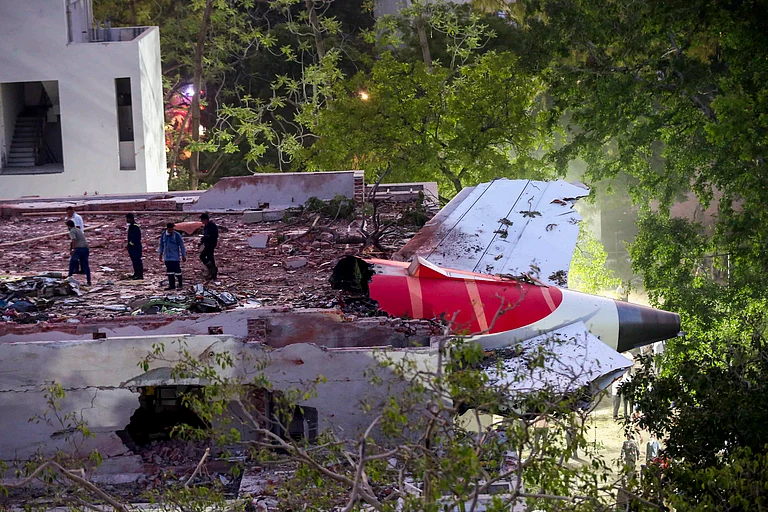SC asked Centre to respond to a PIL seeking independent probe into June 12 Air India crash that killed 260 people.
NGO argued DGCA’s presence on probe panel creates conflict since its own lapses need scrutiny.
Families filed a parallel lawsuit in the US against Boeing and Honeywell over faulty fuel switches.
Supreme Court Seeks Govt Response on Plea for Independent Probe into Air India Crash
NGO flags conflict of interest in DGCA-led inquiry; families also sue Boeing and Honeywell in US.
India's Supreme Court asked the government to respond to a plea seeking an independent investigation into the devastating Air India plane crash on June 12 that killed 260 people.
Responding to a public interest litigation filed by NGO Safety Matters Foundation on Monday, the top court called for an independent investigation, marking its first examination of the probe being carried out by Indian authorities into the incident.
According to Reuters, during a hearing, the NGO's attorneys questioned the probe panel's inclusion of aviation safety agency personnel, claiming it created a "conflict of interest."
"The investigation necessarily involves a critical examination of DGCA’s own regulatory actions and possible lapses," the NGO's plea said.
In Outlook's July 2025 issue "Pre-emptive Unprovoked" uravled the tragic mid-air fallout of the 32-second-long flight, while exposing the cracks in India’s aviation boom.
Shortly after taking off from the Ahmedabad airport, the Air India-operated Boeing 787 lost thrust, killing all but one of the 242 passengers and 19 people on the ground.
The plane's fuel engine switches nearly simultaneously flipped from run to cutoff shortly after takeoff, causing uncertainty among the pilots, according to a preliminary investigative report previously issued by the Indian government.
Reuters reported that some family organisations have criticised investigators and the media for focusing too much on the pilots' behaviour, even though the study seemed to clear Boeing and engine manufacturer GE Aerospace (GE.N).
"Three of the members are the serving officers of the Directorate General of Civil Aviation (flight safety regulator), which creates a very serious conflict of interest," the NGO's lawyer, Prashant Bhushan, told the judges.
The court has ordered the government to react and stated that it will evaluate the demand for a "fair, impartial, independent, and expeditious" probe.
Families of four passengers filed a second lawsuit against Boeing and Honeywell, the companies that produced the switches, in the United States just days before this one.
In the July issue, Swati Subhedar wrote about the lives left behind from the crash and the shared trauma of those who were eyewitnesses to the fallout from the ground.
Avantika Mehta exposed how the aviation community claimed it was just a matter of time before a disaster like this struck the company’s fleet. The work and safety culture at Air India had been lagging for decades, and that this accident was “just waiting to happen”, she wrote.
Gargi Shukla wrote on how the Air India crash exposed the cracks that loom beneath the surface of India's aviation boom. Experts have pointed out that the underlying issues may run far deeper—rooted in years of structural neglect and operational strain, she wrote.
Mark D. Martin expanded on the importance of investigation, implementing its recommendations and holding the Air India management responsible. Those responsible must be held accountable and should be indicted to the fullest extent of the law so that we never see such a crash ever, he wrote in his column.


